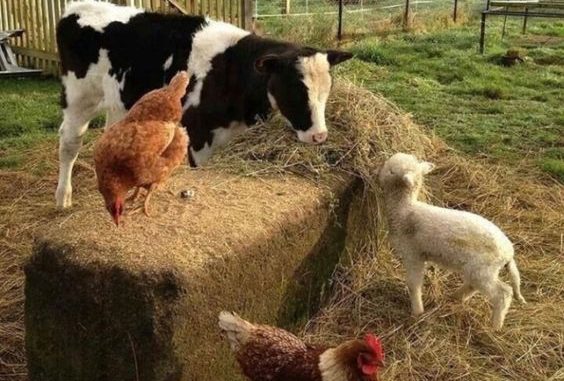
In this article, we will explore the concept of Farm Ranching, a specialized branch of agriculture that individuals can incorporate into their farming practices.
Before delving further, it is important to address the misconception that farming is inherently stressful. While it can be challenging, cultivating a genuine passion for the work can significantly motivate individuals to invest more effort. As the saying goes, “Passion fuels purpose,” serving as a reminder that dedication plays a crucial role in overcoming challenges. Now, let’s get straight to the point, you have the potential to become an exceptional farmer!
In Nigeria, farming serves as a primary source of livelihood. While not everyone in this country may be directly involved in farming, the widespread recognition of agriculture’s importance and the significance of optimal livestock grazing contributes to global livelihoods.
Throughout this article, we will provide comprehensive insights into Farm Ranching and Animal Grazing. Our aim is to equip you with the knowledge necessary to enhance your career in farming.
The content will cover:
- Introduction and Explanation of Farm Ranching
- Benefits of Farm Ranching
- Essential Requirements for Becoming a Successful Farmer/Rancher
By the end of this article, you should have a thorough understanding of Farm Ranching, empowering you in your farming endeavors.


Farm ranching is a branch of agriculture focused on the cultivation of livestock, including cattle, sheep, goats, pigs, and poultry, with the primary aim of producing meat, dairy, and various animal-based products. Typically, these operations are expansive and run on a commercial scale, overseen by professional farmers, thereby contributing significantly to people’s livelihoods.
Livestock, the core component of farm ranching, play a pivotal role in providing protein, catering to the dietary needs of billions of individuals worldwide. Beyond their role in food production, livestock serve diverse purposes such as draft power, transportation, and the production of wool and other valuable goods.
Given the universal need for sustenance, the importance of livestock in meeting this demand cannot be overstated. Moreover, the byproducts of livestock, such as waste, can be utilized to enhance soil fertility, adding an ecological dimension to the benefits derived from farm ranching practices.
Advantages of Farm Ranching
Farm ranching offers numerous advantages, with a primary one being its pivotal role in sustaining a substantial portion of the global food supply. Livestock-derived products, including meat, dairy, and eggs, serve as crucial sources of protein, vitamins, and minerals for billions of individuals worldwide. Moreover, the production of animal-related goods like leather and wool significantly contributes to the global economy.
An additional noteworthy aspect of farm ranching is its contribution to employment opportunities, particularly in rural areas. Many individuals residing in rural communities find employment within the farming and ranching sector, engaging in tasks such as animal husbandry, feed production, and marketing. This becomes particularly vital in developing countries where alternative job opportunities may be scarce.
Farm ranching also plays a pivotal role in natural resource conservation, encompassing land and water. Through efficient resource utilization, farmers and ranchers can enhance food production while minimizing the environmental impact associated with it. Well-managed livestock operations contribute to soil health, prevent erosion, and foster vegetation growth, benefiting both wildlife and the broader environment.
The diversity of animals involved in farm ranching varies based on regional factors, environmental conditions, and the specific type of operation. Commonly raised animals include cattle, sheep, goats, pigs, and poultry. Cattle are bred for meat and dairy production, while sheep and goats are predominantly raised for meat and wool. Pigs are specifically raised for meat, and poultry such as chickens, turkeys, and ducks contribute to both meat and egg production.
Essential Requirements for a Successful Farmer/Rancher
To ensure the optimal health and well-being of animals in farm ranching, it is imperative to adhere to proper husbandry practices. This involves providing the animals with:
- Nutritious Food,
- Ample Water Supply,
- Adequate Shelter, and
- Appropriate Veterinary Care.
As a responsible farmer/rancher, it is crucial to remain cognizant of environmental and animal welfare regulations. Following the guidelines set by government agencies and industry organizations is necessary to guarantee humane and ethical treatment of the animals.
While farm grazing is not widespread throughout Nigeria, it is more prevalent among Northerners due to less stringent policies, making it a viable and lucrative business venture.
Farm ranching is a fundamental component of global agriculture, playing a pivotal role in meeting the world’s demand for food and animal-based products. With diligent management and adherence to husbandry practices, farm ranching can be a sustainable and environmentally responsible means of food production. Additionally, it contributes to employment opportunities and supports rural communities.
Glossary:
Despite the allure of farming, it comes with its share of challenges, notably requiring a significant commitment, primarily in terms of financial investment. As a farm rancher, a deep understanding of your livestock and the provision of the aforementioned essentials are imperative for success.

Leave a Reply